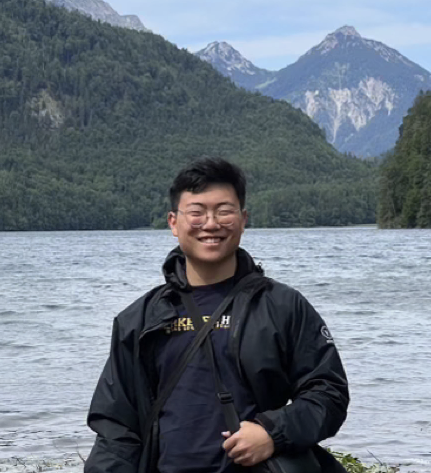Humans of Haas: Robert Paylor
Written by Emma Desilva.
Robert Paylor is a senior, former Cal Rugby player in Haas who grew up in El Dorado Hills, California. Robert suffered a spinal cord injury in the first few minutes of the 2017 Rugby Championships and found himself face down in the turf unable to move anything below his neck. He has since been rehabbing extensively to reach his goal of not needing his wheelchair anymore. Robert describes himself as a public speaker and quadriplegic on a journey to walk again and inspire others.
How has your career path changed from when you entered UC Berkeley and after Berkeley Haas?
I always saw myself growing up as being a corporate guy, taking a very traditional career path like others in my family, but wanting to be really great at it. My sports background has helped me in leadership and working in teams, and I thought being in a traditional sales role would be a great career fit. And then I had my injury. Breaking my neck, I couldn’t do anything. My doctors told me I could never move anything for the rest of my life, and I have since fought out of that. Just today, I walked 200 yards on the football field. I am able to stand out of my wheelchair onto my walker on my own. I have all these goals that doctors told me would never happen, that are now happening.
I’ve had various groups and companies ask if I could share my story with them, and I have, and they’ve loved it. Giving standing ovations and laughing or crying while I spoke. I thought, I have a great passion for this and Haas has helped me turn that passion into a career that I can do full time. I think if I was not at Haas, I would not be able to do this. Because being a professional public speaker is intimidating; it’s like starting your own business where you need a lot of resources and conviction to be able to do something like that. But through talking with my friends, professors, mentors, they’ve helped me make this career switch from being more of a corporate guy, to driving this new career path on my own. You would think a story of quadriplegia would be all bad—what good could come from breaking your neck? But by being able to tell this story with other people and inspiring others, I’ve found that the good outweighs the bad.
How did your interest in becoming a professional public speaker begin?
I did two summer internships with Intel doing operations. Intel had some operational issues at the time and we had been working really hard to fix them. Towards the end of my internship, they were hosting a staff department meeting and asked if I could speak. Probably 150 people in person and a few online. Being an intern, you want to impress the people you work with, so I said yes, I would love to tell my story. Once all the business was dealt with, they handed me the mic and I went through the speech I had formulated on my message on overcoming adversity. They loved it. They really loved it and it was getting talked about all over the company. It really empowered and impacted the employees, and I was sitting there thinking, how could I not do this full time and go all in? I got the full time return offer from Intel, and I really did enjoy working there with everyone, but I thought, if I don’t go for this, I’m going to regret it for the rest of my life. It was after I spoke at Intel and seeing how many people I affected, it flipped a switch in my head and I wanted to go full time.

Is there anyone specific who helped you transition into your new role as a professional public speaker?
It has definitely been my Cal Rugby coach, Coach Clark. He is an excellent public speaker himself. When I first started getting a couple of speaking opportunities, I immediately reached out to him, knowing that he would help me formulate my message. This was not just the message of my story, but of all the things I use to overcome quadriplegia that other people can use to accomplish their goals. We came up with a pretty good speech that we’re always working on. He’s helped me realize my talent and more than anything, that this is something I can do full time and make a living off of. He also helped me with the mechanisms of getting the business setup and all the things I need to be thinking about like, where I can go around and access people who have done this path before.
What are you passionate about and why?
I am passionate about inspiring people and also inspiring myself. I’m not going to lie, fighting paralysis is hard. It’s not just the two hours I spend in the gym everyday, it’s every single second of my life. There’s not a moment of my life where I’m not paralyzed. So I need to be able to motivate myself just to get out of my bed or to take a shower or go to class. It requires a full drive, because there’s no going through the day in zombie mode, I have to go full time all the time.
I love reading inspirational material, looking at what other people have gone through, because everyone has gone through something. For me, my injury is visible, people can see that I am a challenged person. But for just about every other person, you can’t see the thing they go through. And when you get down to it, it’s amazing the resilience that all of us have, especially at a place like this where we have all worked really hard to get where we are. I really found my main drive in inspiring others.
When this happened to me, I thought nothing good could come from it. I thought I would just struggle and struggle and struggle and that would be it. But this is hardly a struggle, being able to use something like this. What happened to me, it’s kind of like a gift. It’s not a curse. It’s not the worst thing that has ever happened to me. Speaking and inspiring others is a gift that I never would have been to do if I had not gotten hurt. And I’m grateful for that. When someone looks me in the eyes and says, you inspire me and that they’ve done this or that because of what you told me, man, that’s such a purpose and I’m grateful for it.


